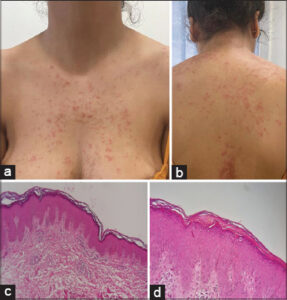Prurigo pigmentosa induced by the ketogenic diet “Keto Rash”
Chaimae Ait Khabba 1, Marwa Asermouh1, Mariame Meziane1, Kaoutar Znati2, Karima Senouci1
1, Marwa Asermouh1, Mariame Meziane1, Kaoutar Znati2, Karima Senouci1
1Department of Dermatology and Venereology, Ibn Sina Hospital, Mohammed V University, Rabat, Morocco, 2Department of Anatomo-Pathology, Ibn Sina Hospital, Mohammed V University, Rabat, Morocco
Citation tools:
Copyright information
© Our Dermatology Online 2023. No commercial re-use. See rights and permissions. Published by Our Dermatology Online.
Prurigo pigmentosa is a rare inflammatory dermatosis. It is twice as common in women as in men. The age of onset is generally in the second decade [1]. It is clinically manifested by very itchy erythematous papules located mainly on the back, trunk and neck in a reticular pattern. The evolution is characterized by residual mottled hyperpigmentation [2]. The histology shows in the initial phase a superficial and perivascular infiltration of neutrophils. In the second stage, we note the presence of micro-abscesses and ballooning of the keratinocytes associated with spongiosis. The terminal stage is characterized by the appearance of a lichenoid infiltrate composed essentially of eosinophils and lymphocytes.The pathogenesis is unknown, but triggers have been reported such as friction from clothing, acupuncture, sweating, allergic reactions, pregnancy, anorexia, Helicobacter Pylori infection, and ketosis[3].This ketosis can be induced by various factors such as fasting, ketogenic diet, diabetes, or bariatric surgery. The treatment is essentially based on the interruption of the ketogenic diet, associated with taking oral doxycycline, ranging from 100 to 200 mg per day for two weeks to two months.
We report a case of a 30-year-old patient who consulted for a very itchy rash on the trunk and back that had been evolving for 3 weeks. The patient had been following a ketogenic diet for two months with a loss of 5 kg. On examination, she presented with erythematous and hyperpigmented papules confluent into reticular plaques on the trunk and upper back (Figs. 1a and 1b). A skin biopsy was performed showing minimal spongiosis with an inflammatory dermal infiltrate, mainly lymphocyte with perivascular disposition, confirming the diagnosis of prurigo pigmentosa (Figs. 1c and 1d). Three weeks after stopping the ketogenic diet, the pruritus improved with persistent of mottled hyperpigmentation.The patient refuses to take any medication.
Consent
The examination of the patient was conducted according to the principles of the Declaration of Helsinki.
The authors certify that they have obtained all appropriate patient consent forms, in which the patients gave their consent for images and other clinical information to be included in the journal. The patients understand that their names and initials will not be published and due effort will be made to conceal their identity, but that anonymity cannot be guaranteed.
REFERENCES
1. Alshaya MA, Turkmani MG, Alissa AM. Prurigo pigmentosa following ketogenic diet and bariatric surgery:A growing association. JAAD Case Rep. 2019;5:504-7.
2. Michaels JD, Hoss E, DiCaudo DJ, Price H. Prurigo pigmentosa after a strict ketogenic diet. Pediatr Dermatol. 2015;32:248-51.
3. Hijazi M, Kehdy J, Kibbi AG, Ghosn S. Prurigo pigmentosa:a clinicopathologic study of 4 cases from the middle East. Am J Dermatopathol. 2014;36:800-6.
Notes
Request permissions
If you wish to reuse any or all of this article please use the e-mail (brzezoo77@yahoo.com) to contact with publisher.
| Related Articles | Search Authors in |
|
|





Comments are closed.